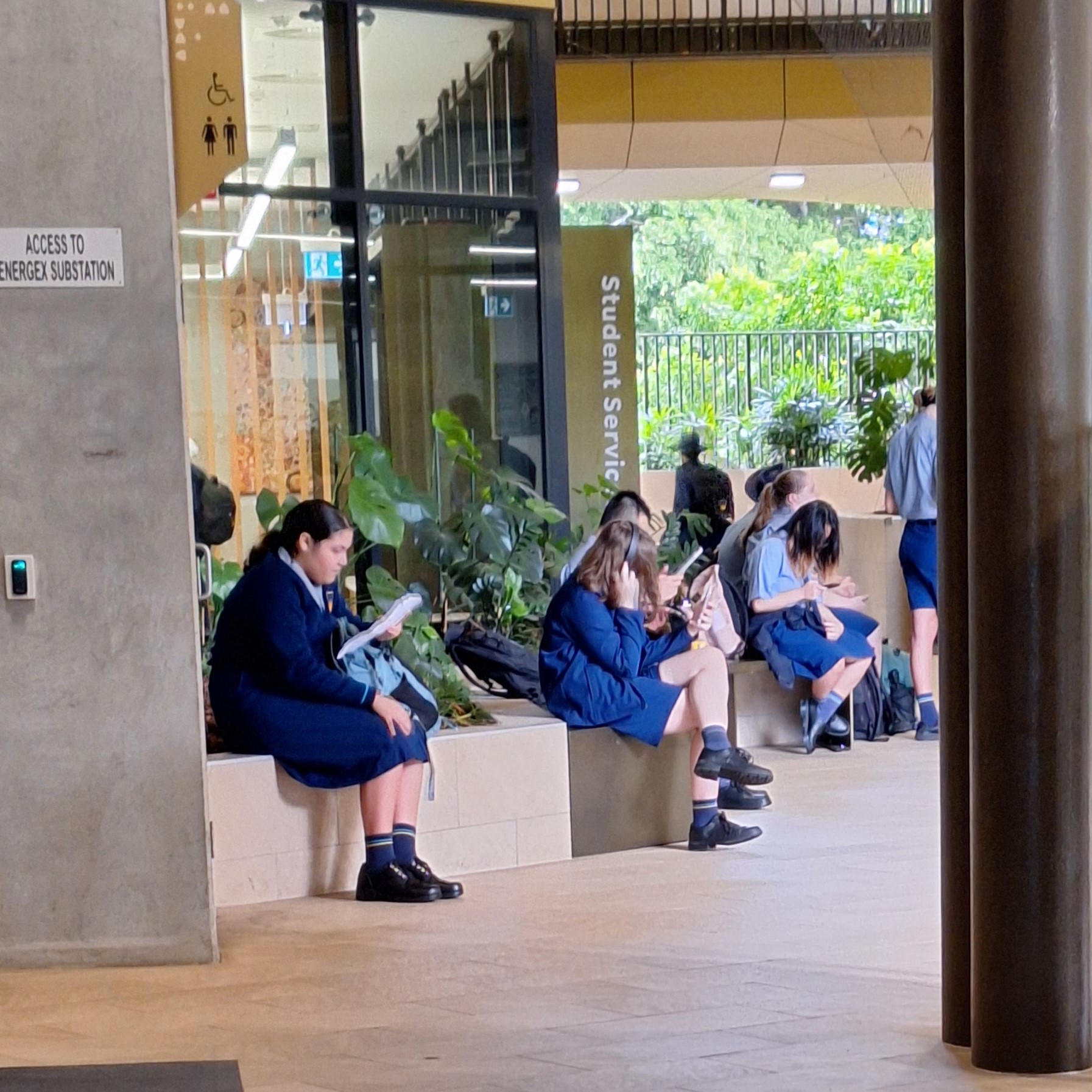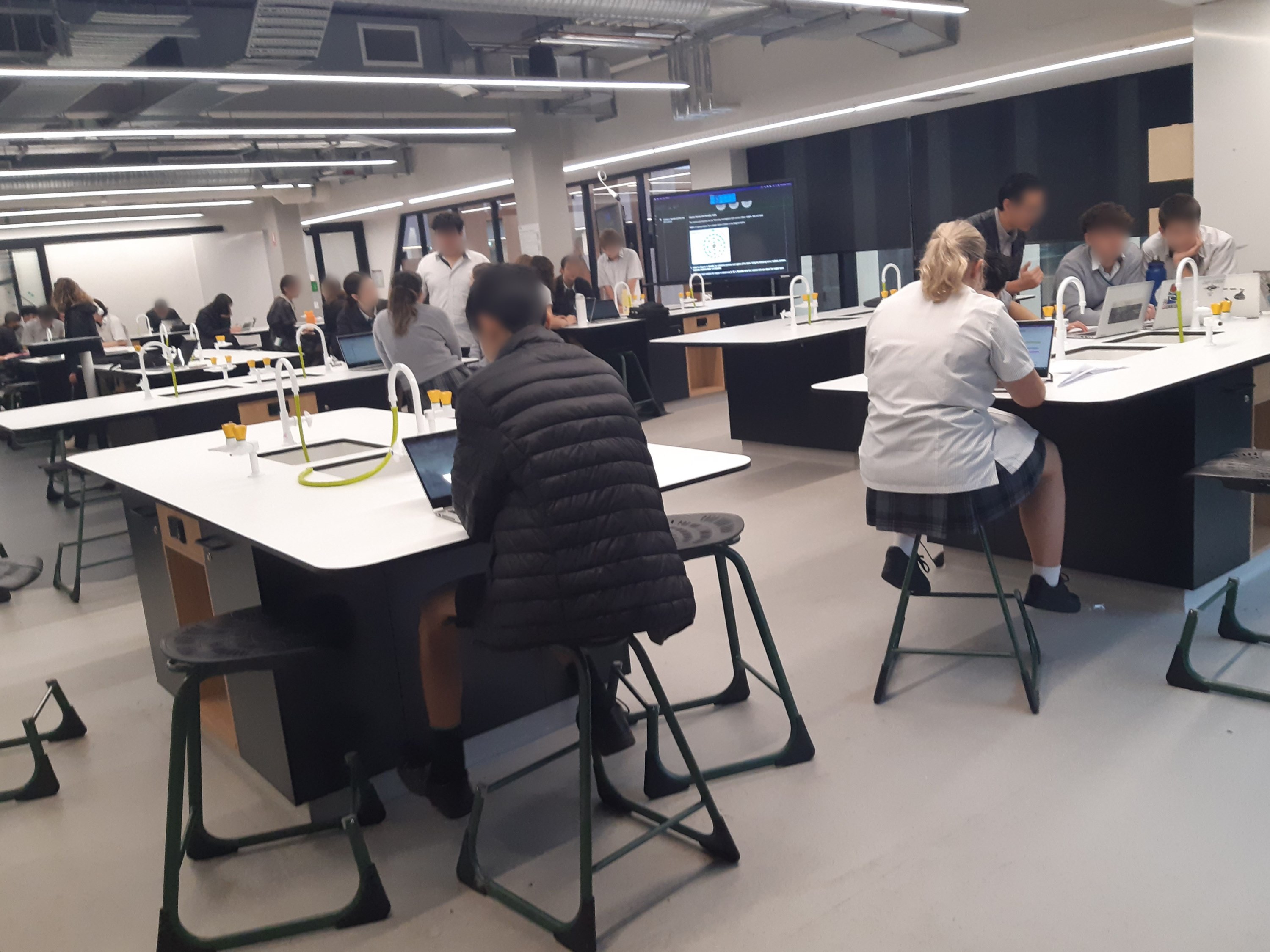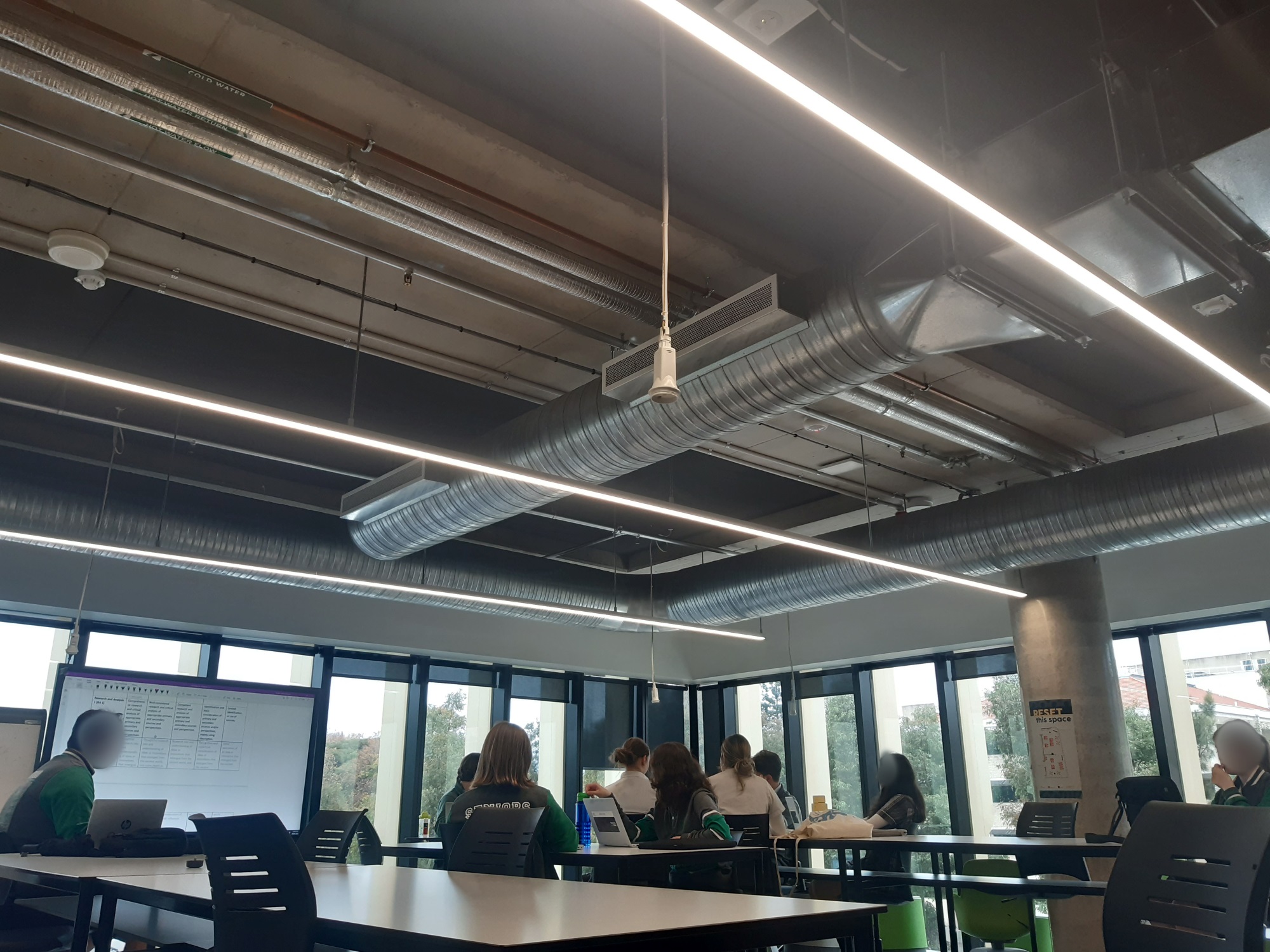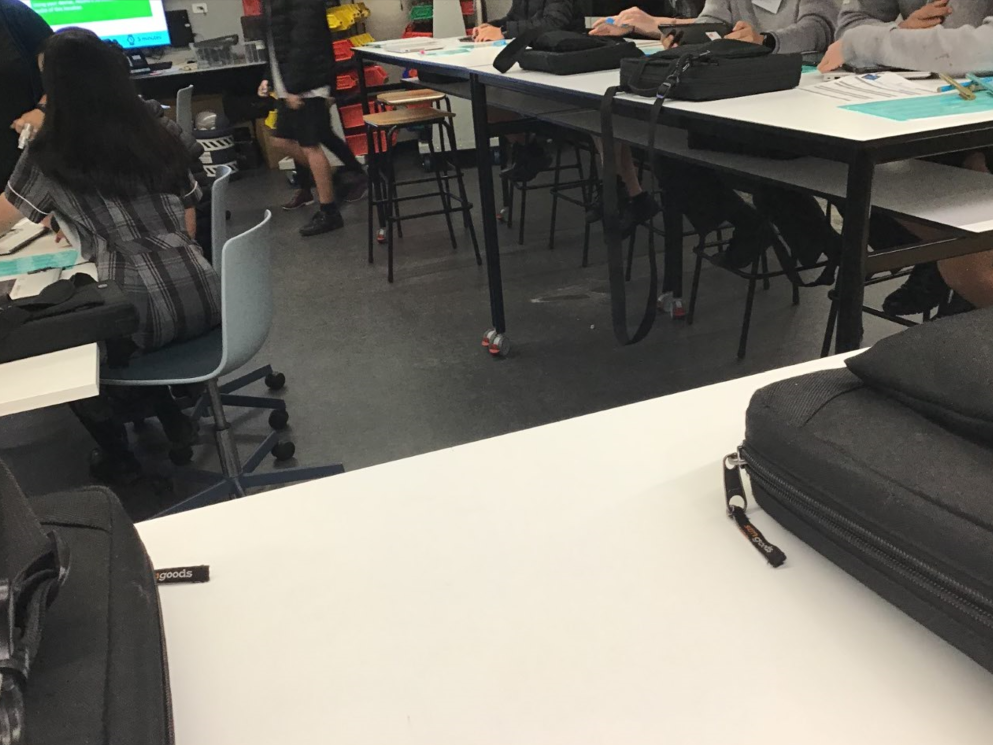height for calm inside
“The higher levels is just more calm, though, because like, everyone's like more older and it's like more like mature.”
Story by:
Professor Jill Willis &
Dr Andrew Gibson
“You feel calm and just relaxed. Like you shouldn't feel any stress to do what you're supposed to be doing. Like you should just be able to focus.”
"Like a lot of people the way they can focus or reset is with music.”
“I like a closed classroom, no noise. And then I can just focus it depends on you know how the day is actually going. Yeah, it's It's also about who it is, who it is, what the time is, what the time of year is as well.”
“For me personally, I can't focus as well when everyone's talking like I need to be in a quiet space or just have no noise around me.”
“Sometimes you need privacy to focus, if something has happened at home”
Focus was more than being able to have mental concentration although that was a part of what students described. Focus was recognised as an optimal state for learning and wellbeing.
But focus ebbs.
and focus flows.

There are times when it is harder to focus, so an escape to a place to reset or find your focus again is essential. So too is the need to rest, relax, or reset in between periods of sustained or intense focus.
Spaces can assist students in creating the conditions to focus by providing “pleasure, familiarity, security, a feeling of belonging, observing things, sorting out one's feelings, clearing one's mind, solving problems, concentrating, memories from the past, freeing the imagination, the courage to be yourself, relaxation, personalisation, control, privacy and escape from social pressures.”
Focus is associated with academic learning, but also about a sense of wellbeing and comfort in the school environment. As the following data stories show, focus is about a sense of actively managing yourself and your environment for thriving.
Focus is a feeling
Calm
Relaxed
Be yourself
Have your own thoughts
Professional
Focus is also making choices to curate conditions
Reset
Take a break
get your energy out
Refresh your mind and body
Students do have the resources to take care of themselves.
“Quiet rooms almost are harder to focus in I think, um, personally for me, just because, I don't know, it just doesn't feel as cozy.”
Students want to be safe, relaxed, chill, and comfortable. To be able to self-regulate.
“It's like going in like, tapping into yourself and try to figure out like what you need to do for yourself. And I think because the balcony can either be loud or quiet.”
Students want to feel calm and energised. They want to feel optimal psychological comfort.
It can be an individual experience and also a shared mood.
Nature, comfort, energy and privacy in balance can be ways to curate the environment for preparing, entering, maintaining or re-entering the state of being focused.
It means... to feel calm
“I think focus sort of means when you feel safe and comfortable.”
“...Calm and just relaxed. Like you shouldn't feel any stress to do what you're supposed to be doing. Like you should just be able to focus.”
Focus means... curating your space to feel comfort
“I find that I focus better in smaller classrooms. But that's just me, and I feel like it just makes it easier to not get distracted.”
“...Calm and just relaxed. Like you shouldn't feel any stress to do what you're supposed to be doing. Like you should just be able to focus.”
“For me, like if I really like working in bigger classrooms…I can be more productive and achieve more in the learning.”
Focus means... being aware of what helps
“People have their own ways of being, like, concentrating in class.”
“Some people just can't work after their brains, like have been super stimulated in their body, so they need to slowly calm down.”
Focus means... taking action to meet your needs to self-regulate
“Basketball clubs and basketball like thing like trainings that are set up. And some people, like go to that and they kind of get their energy out there before school so that when they come into school, they're relaxed and calm after doing that”
“Sometimes you need privacy to focus, if something has happened at home.”
“Sometimes you just need to walk to that random bubbler in the middle of the hallway”
The solace video above explores how focus is easy in the small breakout room with comfortable chairs and view to the outside world.

It is much harder to focus in the larger rooms where you are sitting for two hours on a stool...

...while there are noises from the taps,
beeping from the doors,
overhead lights with white glare.
The pressure builds
and builds
and builds
Okay. Make a plan to reset yourself.

You ask the teacher if you can go to the toilet and it's a yes.
Sigh.
“Like, people like to just check on themselves.”
“Ha! That Video of going in to the toilets and sit there. That was me this morning. I feel like that is a place to calm down is good because, you know, I just, like, sit in the bathroom when you're like, You know, if you need if you're like too stressed and stuff.”
Managing the together/alone paradox sometimes means finding spaces for resetting.
Finding spaces to relax in between times of intense focus is essential for learning and wellbeing, however In a vertical school there are always other people nearby. The proximity to others can mean that favourite spaces or ways to use spaces may not always be available, or within the space people need different things.
Finding ways to be alone while you are in community together can create a greater understanding of how to manage your own needs to reset or get your energy out, as well as appreciation for others' needs.
Thriving can mean finding places of freedom to manage yourself often in a favourite place. In that space you can refresh your mind as you connect to nature, work, play, or take a break. In a vertical school where there are many people to share the spaces, this freedom can be experienced as co-regulation, so you can be alone with others.
“Like you've gotta calm yourself down and come back to that same sort of being calm. But then then you can refocus.”
“The higher levels is just more calm, though, because like, everyone's like more older and it's like more like mature.”
“I feel like the rooftop is really good for focusing because I feel like you're one of the only people there since like it's outside. But then, like you're not near all the cars on the street, it's just quiet, and then it it helps you relax and then focus.”
“I remember coming from primary school and, like, primary school is just fun. You don't really think about work in primary school. And then I came and I was like, Well, this is a lot you're walking with people who are, like, 17. 18 or yeah, but like older people in this one big school I. I think I came. Now it's kind of washed off a bit, but I think I definitely came into high school feeling like this was more professional, more proper.”
"It's a mindset. It's like because it's a vertical school and because all our classrooms are glass, there's not really many places you can try and go to shut up. It's all about how you look at things. If that's going outside to the balcony for lunch and then coming back in and knowing what subject you have, and just like flipping your brain. No one tells you you have to do that. But I think especially as you progress through school, it becomes a new responsibility to focus in class. I don't think I wouldn't say there's a specific place I go to focus more. It's more I will go somewhere because I've decided I'm going to focus."
Focus is important to learning and wellbeing. Students recognised that focus was a desirable state and that experiencing a sense of focus was meaningful. Focus was felt as a sense of refreshment that was supported by connections to the breeze and to light, and access to comfortable spaces that could support meaningful activities. Students showed a high degree of awareness, and clearly articulated how they make use of spaces to manage their feelings. Focus also fluctuates. The spaces that might support focus on one day may not be the same the next time. Having predictable access to more than one way to manage their focus was part of the way they found spaces made sense, that is they were comprehensible.
Focus is associated with a sense of coherence, those moments when everything comes together. A person's internal world and the external world feel in sync, and there is a sense of being able to do something interesting. As one student described the feeling “You feel like you can do work easily and you just want to get all your ideas down and you're just like, don't want to stop. You just wanna keep writing a story or doing the maths questions.” They went on to add that “But sometimes you don't get that feeling, and that's and if you're not in a good space, it affects that feeling” (Student Focus Group).
Thriving is enhanced when spaces provide psychosocial comfort. At different times managing focus depends on whether students can control who else is in the space. This may sound like a request for privacy, or more space. Students valued spaces where they could go to recognising and manage their feelings.
“Sometimes you need privacy to focus..”
SS Go there to have some alone time and be happy to be alone. HS Go there to be alone and with yourself and hear your feelings. MS You can have some privacy if you're feeling down and you are not feeling the best.
Thriving is enhanced when spaces are predictable. Knowing when you can and can't access a space, or having enough of those valued spaces available when needed gives a sense of confidence.
“I see a lot of year 11, just like in quiet areas, studying by themselves. But like next year and in the coming years, if we want to study by ourselves, it would be harder to find a space to do that.”
Thriving is enhanced when spaces invite engagement and inspiration. Atmospheric elements like sound can set the mood, ready to focus.
“Sometimes during break, the school will play, um, music on the, um, the speakers. And I find that listening to music and heading off to class like it really lifts up my mood. And I think if we could do that more often, that'd be really nice to, um maybe during transition time, having some music, like if it's calming, if it's energising.”
Thriving is enhanced when environmental conditions like light and breeze can feel refreshing. Sensory comfort can help spaces feel manageable.
“Our school, it's very open has lots of light coming in, But sometimes being in a room, that's kind of dim. Just doing your work, sitting there I find can be really helpful. And that's personally what helps me focus.”
Thriving is enhanced when environmental conditions like breeze combine with choices of where to go and what to do. Together they create a feeling of safety to refresh your mind.
“It's a safe place and everyone are allowed to read it by yourself, because when you when you like, sit there, the wind that blows you and it's refreshing your mind because you got other stuff. So it's a safe destination.”
I would challenge any educator to tell me that they've seen a child that's uncomfortable that can focus…In my life, if I'm uncomfortable, I can't focus. It doesn't matter what the situation is, especially if you're trying to learn. So that means we want to take on this knowledge: If you're uncomfortable, you can't do it.
How might predictable access to places to reset be balanced with a need for students to be supervised, safe and engaged?
How might plants and screening be used to create nooks that provide both prospect and refuge?
What permissions are needed to make use of balconies and breakout rooms?
How might students be supported in self-regulating in class?
How might the be supported by considering the gaps in between classes?
What about students getting their energy out when they need to?
What about different year levels at school having different needs?
How can students find spaces to play and be energetic during the day?
How can the permeability of the vertical school be more of an asset in enabling students to regulate their energy?
How can stairs be a fun way to create energy?
What about climbing walls, VR exercise rooms, small gyms with stationary bikes, and regular use of local parks?
We asked the students to give us their stories. They responded with images, post-it notes, videos, and mini documentaries. We've collected all of these and created more stories that highlight their everyday experiences as students in UV schools.
explore more stories